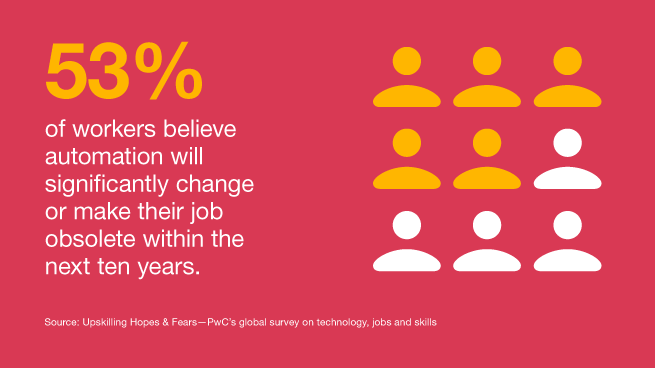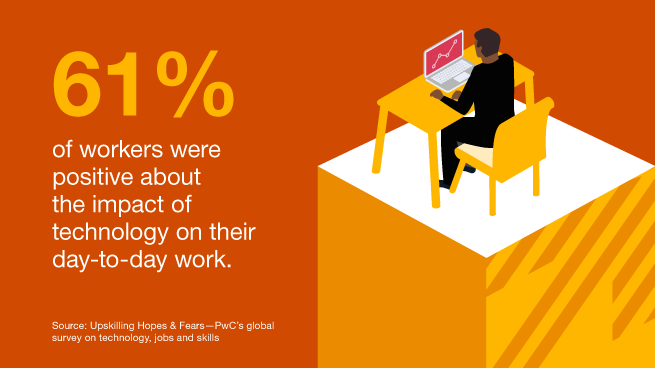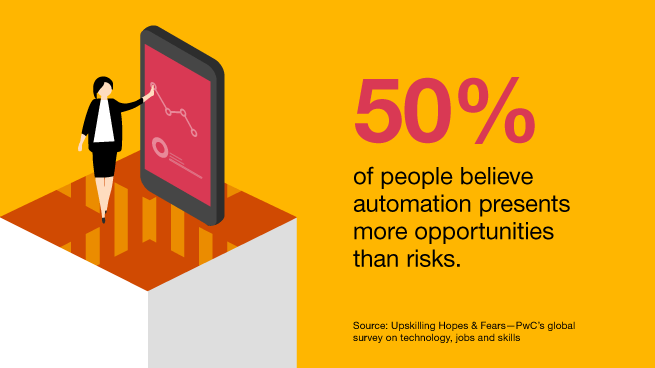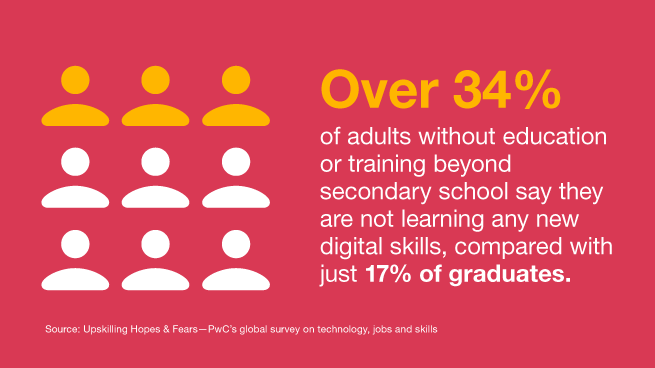{{item.title}}
{{item.text}}

Download PDF - {{item.damSize}}
{{item.text}}
As part of our commitment to close the digital divide, we’re committed to bringing resources to educators and students that may not otherwise have access to them. We’ve collaborated with Code.org to create a technology skills curriculum for students.
The curriculum is composed of easy-to-follow lesson plans accompanied by engaging activities on topics such as cybersecurity, data analytics, web and app development and internet of things. It helps students make connections between technology topics they might be interested in and potential careers in those areas.
We’re social and collaborative beings by nature. But collaborating through a screen isn’t exactly natural. From leading and managing virtual teams to technology considerations and working virtually with customers, we explore the essentials of remote working.
Explore virtual workOur jobs are changing, and fast.
Many roles are disappearing altogether, while new ones are springing up from nowhere. It’s estimated that each year, in almost every organization, 5 to 10% of roles will radically change, creating severe skills mismatches. The discrepancy between the skills people have and those needed for jobs in the digital world is one of the most critical problems of our time.
It’s a problem for individuals, businesses, governments, policymakers and other institutions—because it’s a problem for everyone. And we need to work together to solve it.
Upskilling is more than just training. It’s about gaining the knowledge, skills and experience for new and transformed roles, and being equipped to participate and adapt in an increasingly digital world.

We asked more than 22,000 workers from across the globe to share their hopes and fears. Here’s what they told us:
Workers know automation will change their jobs, and want to learn new skills to improve their employability.
In fact, most workers welcome new technologies.
At least half believe that automation presents more opportunities than risks. They believe that automation will improve their job prospects and enable them to achieve digital proficiency or become an expert.
The level of education impacts people’s optimism. College and university educated respondents are the most optimistic about technology and their future employment prospects—even though they believe their current job is likely to change significantly or be displaced. Younger respondents prefer to develop proficiency in a specific technology, while older respondents are keen to build proficiency at learning and adapting to new technologies as they develop:
The digital revolution requires a skills revolution. The skills revolution is about helping people build their digital awareness, understanding and skills to fully participate in the digital world — and it needs to start now.
Organizations are transforming their workforces to drive productivity, innovation and growth. Upskilling is key. It’s about anticipating the right skills for the future, laying the cultural foundation, delivering modern upskilling programmes, and building a learning and development function with the right EdTech to deliver a vastly better return on upskilling investment.
The digital divide is already a significant global problem and is at risk of getting worse if we aren’t successful in helping those currently excluded from the workforce and the next generation to build the right skills. We are working to reach those where the need is greatest.
Solutions to the challenge of upskilling will need to be developed at the local, regional and national level, and no one organisation can do this alone. Government leaders and policymakers need to ensure that citizens have the knowledge to participate, and they themselves have the knowledge to drive discussion on the future of technology and regulation. Institutions, such as those that make up the education system, need to digitally transform themselves and at the same time provide services that are fit for the future.
The need to upskill is a complex problem that will require decision-makers — educators, national, regional and local government administrators and business leaders — to come together. If you would like to find out more about what we at PwC are doing, get in touch.
Upskilling equals opportunity. The global PwC network has come together to close the digital divide and provide opportunity to millions of people across the world. PwC’s Global Chairman Bob Moritz and Carol Stubbings, Joint Global Leader, People and Organization, explain how PwC is preparing the global workforce for unpredictable and emerging technologies.
Explore our upskilling


